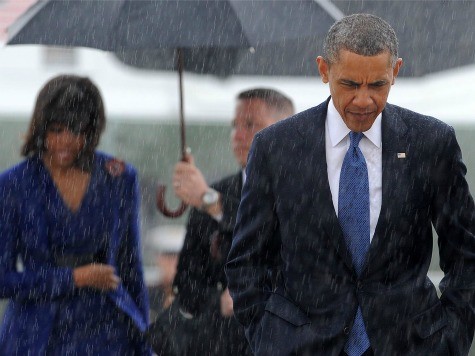
Just a year ago, President Obama, seen as vulnerable since the 2010 midterm, handily defeated Mitt Romney to win an historic second term. The GOP still controlled the House, but Democrats kept their majority in the Senate, an outcome that seemed impossible a year earlier. Obama’s approval ratings rose and he confidently predicted that his reelection would break the Republican “fever” in Washington. Instead, National Journal, a respected liberal publication, argues he “blew it.” Obama lost 2013.
“For the president, it has been a very tough year,” writes the Journal’s George Condon. “Almost nothing that Obama publicly predicted would follow his reelection has come to pass.”
For much of 2013, the White House was on the defensive over several major scandals. Investigations by the House GOP unearthed new and damaging information about the Benghazi attacks. There were revelations that the IRS was illegally targeting conservative and tea party organizations for invasive scrutiny of their applications for non-profit status. Leaks by Edward Snowden revealed government surveillance efforts far more extensive than the public, and even lawmakers, realized.
The White House defense in each of these scandals was, essentially, managerial incompetence. President Obama didn’t know about the security vulnerabilities in Benghazi nor the increase in threats there. He didn’t know what the IRS was doing. On surveillance by the NSA, Obama argued both that the snooping wasn’t as broad as it seems and, in the cases it was, he didn’t know about it.
This managerial incompetence is on full display now, as the government struggles with the rollout of ObamaCare. Its billion-dollar website simply doesn’t work and is unlikely to be ready by the White House’s new November 30 deadline. Millions of Americans are losing their existing insurance coverage, despite repeated assurances from Obama that they could keep it.
Obama also reacted poorly to events that arose throughout the year. After the tragic Newtown shootings in Connecticut, Obama made an aggressive push for gun control. The effort was unpopular and failed in the Senate, sacrificing a large amount of Obama’s political capital.
His dithering and aimless policy in the Middle East has confused allies and emboldened enemies. He took a hard-line on Syria and then promptly got rolled by Russian President Putin. Now, he is openly negotiating with Iran over its nuclear program.
National Journal notes that part of Obama’s problem is the kind of campaign he ran to win reelection. This is true. His campaign was based almost solely on tearing down Romney, rather than a new mandate for a second term. Indeed, on most major issues, voters agreed with Romney. They felt Romney also was a stronger leader, had a better plan for the economy and future, and a greater ability to get things done.
On the question of which candidate better understood and cared about them and their issues, Obama won overwhelmingly. He was reelected on his personal attributes, not his policies. Empathy, however, is not an agenda.
Obama has three years left in his term. His approval ratings, though, have recently dropped into the 30s, a level similar to Bush’s at this point in his second term. Obama no longer has a full-scale campaign and a single opponent for contrast, so, without a major course-correction, its hard to see how he lifts his poll numbers.
The second term curse, wherein reelected Presidents become bystanders to domestic politics as others rise to the national stage, seems to have come earlier for Obama than past Presidents. Vulnerable Senate Democrats up for reelection next year are already trying to distance themselves from the problems with ObamaCare. That phenomenon will accelerate in the coming months.
Obama lost 2013. Or, in the words of the National Journal, he “blew it.”

COMMENTS
Please let us know if you're having issues with commenting.